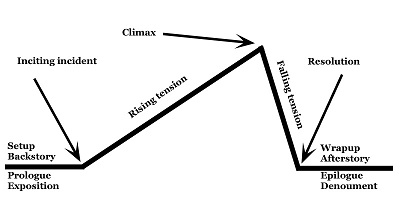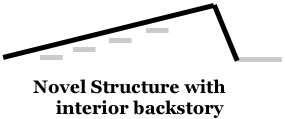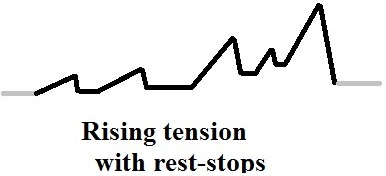Modern tastes tend to go for less of a prologue and epilogue - maybe we have shorter attention spans than the ancient Greeks?
I’d guess it has more to do with he was talking about plays. You can’t change scenery very much or often. But in a novel or a movie it’s easier to dice up a story and tell it in flashbacks and other pieces. So you come up with a structure more like this. (Where the grey is the backstory and afterstory.)
TV has taught us to expect stories with a short grabber at the beginning. Otherwise we might flip channels to find something else; another reason to stick parts of the backstory inside the main body of the play. Too, we often watch shows with an established backstory of cast and situation. And if the story is part of a detective series the MCs are detecting the backstory of a murder or whatever as part of solving a crime.
We might also have more ups and downs than this simple model would suggest. A mini crisis, a minor setback, a sub-plot, that sort of thing.
Yeah. That diagram is an overview. Most stories of any length are like the following. With comic or other kinds of relief for when a story gets too intense for the audience.
I've tried doing timelines and index cards and all the rest and all it did was confuse the living daylights out of me. ... [But] I gave up. I grabbed the first plot bunny that winked at me and just wrote the damned thing. ...there was no underlying structure before I actually wrote it.
Every writer is different. Some are outliners, some are improvisers, and the rest of us do a little bit of both.
... isn't this the Western/European way of looking at literature?
I don’t think so. I studied Chinese language and literature on my way to becoming a (Mandarin) Chinese linguist. There are plenty of stories going back thousands of years that have some of the same structure.
It’s just that this structure is only one of many possible ones. It’s most useful if we use it to stimulate our imaginations, but not to let it straightjacket them. And one of the ways to stimulate is to say: Screw that! I’M going to mix it up or throw it away entirely.
I've been thinking a lot about conflict and conflict-is-king. But I'm wondering if there are other things that keep a story moving.
In some kinds of stories, sure, there’s a lot of conflict. But the idea that there are no other kinds of stories is another straightjacket. I’d say CURIOSITY is king: What happens next?
Road stories come to mind, where sightseeing is the main motivation, discovering America or some other land, the places, people, and customs. Or discovering oneself, a spiritual journey. Where the worst conflicts are flat tires or needing to find a diner or wiring home for more money.
Sure, you can stick conflicts in there. In a road trip by hippies they might get beat up badly or maybe even killed by rednecks.
Aristotle's line is useful; in that you ought to be aware of it. But it isn't Procrustes' bed. For myself, in plotting, I favor chiasmus. The quadriga is the form I most often recommend, irrespective of plot.
You bad boy. NO LINKS to
chiasmus or
quadriga? Meanie.
All sorts of structure ideas are possible, such as the much-discussed Hero’s Journey. But they should (as several in this thread point out) be used (if at all) as starting points, idea stimulators.





